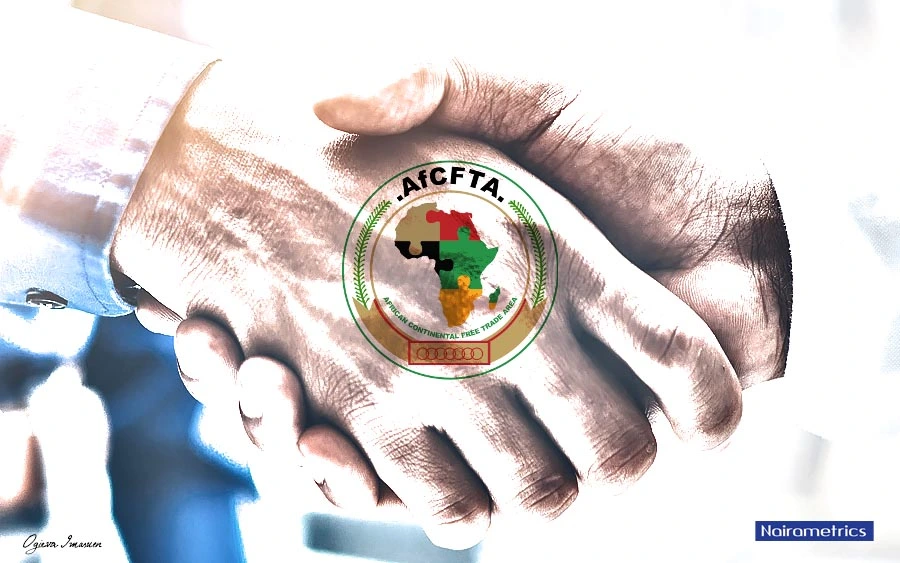
Implementing the AfCFTA: Why A comprehensive Communication Plan Among Member States is a Priority.
Discarding the Board Room Jargon
The African Continental Free Trade Area (AfCFTA) agreement is two years old. The year 2023 marks the continued fruition of the operational phase of the agreement that brings together African countries to create a single market for goods and services across Africa, thereby boosting intra-African trade and promoting economic integration among African countries. This is by facilitating a freer movement of goods, services, capital, and people across the continent while enhancing her competitiveness, inclusive economic growth, development, and better negotiations on trade agreements. In the operational phase, key instruments adopted include the rules of origin, tariff concession framework, an online mechanism for monitoring, the creation of a pan-African payment and settlement system, and a trade observatory portal. While there are continued efforts to involve the private sector, the international community, and the general public at country levels in implementing the AfCFTA, these instruments largely remain boardroom jargon. Access to periodic information on the ongoing implementation efforts, negotiations, concessions, and agreements is required. Reliable and timely information for all is the hallmark of a successful AfCFTA. Therefore, a clear communication framework at the country level is of critical urgency.
Converging the Public and the Board
A clear and effective communication plan is essential for ensuring that all stakeholders are aware of the benefits and opportunities of the AfCFTA and can participate in its implementation. At the national level, clear public relations would increase awareness and understanding of the AfCFTA among businesses, especially small and medium-sized enterprises and the general public. It would encourage active participation and engagement of the private sector in implementing the AfCFTA. It is incumbent upon African nations to communicate for the AfCFTA to generate a sense of ownership among all stakeholders, including the public, private sector, and civil society, by providing regular updates and feedback on the progress of the AfCFTA. There are also misconceptions and concerns around the free trade area among stakeholders that nations will need to address. This can be achieved through clear communication around policies, regulations, and processes while providing feedback and input on an ongoing basis to the needs and priorities of consumers. Including the private sector and the general public in the Communication Plan will ensure that the implementation of the AfCFTA is more inclusive, transparent, and effective.
Stakeholder Engagement: Maintain awareness and understanding
A comprehensive communication plan is needed to target national and international bodies and stakeholders, including governments, the private sector, their associations, and civil society. It’s upon national bodies, such as Nigeria’s AfCFTA National Action Committee, to create and maintain awareness and understanding among all stakeholders. The old ways of regular press releases, interviews and public events are suitable. Utilizing the media, including traditional and social media, to reach a wide range of audiences and provide information on the AfCFTA is necessary. There is certainly no way to benefit everyone without a comprehensive plan to reach all.
“Access to periodic information on the ongoing implementation efforts, negotiations, concessions, and agreements is required. Reliable and timely information for all is the hallmark of a successful AfCFTA.”
National implementation committees need to further Partner with civil society organizations, including business associations, trade unions, and youth groups, to raise awareness and understanding about the AfCFTA and its potential benefits. The implementation frameworks ought to encompass mechanisms for providing training and capacity-building programs for businesses, especially small and medium-sized enterprises, on the benefits and opportunities of the AfCFTA and how to take advantage of them. The devolvement of the communication plan should include holding public forums and debates to encourage discussion and engagement among stakeholders on the AfCFTA and its implications. Increasingly, the national committee will need to Publish regular updates and progress reports on the AfCFTA to provide stakeholders with the latest information and demonstrate the government’s commitment to its implementation. Digital platforms, such as websites and social media, should also be utilized to share information and updates about the AfCFTA and to engage with stakeholders in real time.
It is critical for the national steering committee among member states to focus on mapping and segmenting different audiences and target them when rolling out the communication plan. Varied communication approaches for different stakeholders create effectiveness in messaging efficiency and acceptance for better implementation of the free trade area. The communication plan will need to encompass the identification of champions of the AfCFTA and sensitize and engage them on the rollout of the communication plan. Tantamount to celebrating success stories; this will increase acceptance of the framework within all levels in the general public.
Going Beyond the Limits
African countries are comprised of multiple ethnicities and local language groups that need to be mainstreamed. The national implementation committee will need to capitalize on this strength and develop relevant content in the local languages where possible to promote the AfCFTA agenda. Videos, fliers, newspapers, articles, animations, and images are all suitable with their appropriateness flagged a digital media that is readily available. The sensitization exercises need to target government-level employees with sector-specific information in the implementation stage. Communication of the AfCFTA promise has to be approached to realize the dream.
Muoki Musila is an Kenyan based economist. These are the writer’s own opinions and do not necessarily reflect the viewpoints of Liberty Sparks. Do you want to publish in this space? Contact our editors at [email protected] for further clarification.



